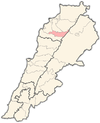Hadath El Jebbeh
Hadath el Jebbeh
حدث الجبة | |
|---|---|
City | |
UTC+3 (EEST) | |
| Dialing code | +961 |
| Website | www.hadatheljebbeh.com |


Hadath el Jebbeh (
Hadath el Jebbeh is a summer resort and touristic place, benefiting from its welcoming and friendly local families. The inhabitants of the village are mostly
Location, climate and nature
Hadath el Jebbeh is located in Bsharri District, overlooking Qannoubine Valley. The village is 94 km away from Lebanese Capital, Beirut, and 36 km away from Tripoli, the largest city in North Lebanon.
Hadath el Jebbeh is well known by its cold (sometimes freezing) snowy weather during winter, and its cool weather during summer, which makes it lovely to visit anytime throughout the year, especially in the summer season, where numerous Lebanese consider it one of the best summer residences in Lebanon.
Etymology
Hadath is the name of three localities in Lebanon. To differentiate between the localities, the name of the region is added,
The Semitic root of Hadath means "the new", hence the name could mean "the new town".[1]
The common pronunciation of the name is Hadad or Hadid.[clarification needed] It gives an indication to a probable different meaning. Hadad was the northwest Semitic storm and rain god and the town could have had a temple dedicated to this god. And the popular tradition claims that the church dedicated to the saint patron of Hadath, Saint Daniel, was built on the remnants of a pagan temple.[2]
Jebbeh is the traditional name of the
See also
References
External links
- Hadath Ej Joubbeh, Localiban
- www.hadatheljebbeh.com
- www.hadath.com Last retrieved on May 8, 2008.

